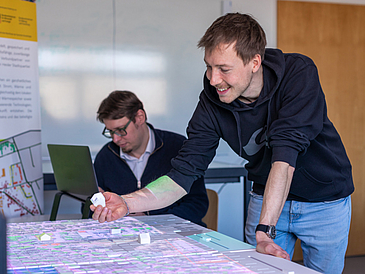Using the example of the Rüsdorfer Kamp neighborhood in Heide, researchers from the U Bremen Research Alliance are developing solutions that are sustainable, resilient, and transferable as part of the “Quarree100” project. Not only should as many people as possible benefit from the knowledge, but they should also be able to broaden it – via open science.
The wind usually blows from the west, coming from the North Sea, and often with considerable force across the flat Dithmarscher Land. The locals speak of a “stiff breeze,” which can also be recognized by the fact that many wind turbines stand still – a paradox that not only irritates tourists from the south who are vacationing here. On windy days, the electricity generated by the wind turbines overloads the grid, and only shutdowns keep it stable. 3750 gigawatt hours were lost in this way in 2019, and almost 400 million euros in compensation had to be paid by the state to the operators.
That is about to change. One goal of Quarree100 is to no longer waste energy, but to store surplus wind energy and relieve the overall system. The project’s coordinator, Dr. Torben Stührmann, puts the overarching concern this way: “We want to make the portfolio CO2-neutral as quickly as possible.” Stührmann is acting team leader of the Resilient Energy Systems department at the University of Bremen, a member institution of the U Bremen Research Alliance.

![[Translate to English:] Zur artec Startseite](/fileadmin/user_upload/sites/artec/Bilder/Logo/artecWortmarke200px.gif)
